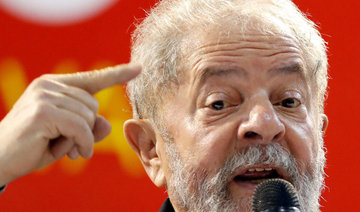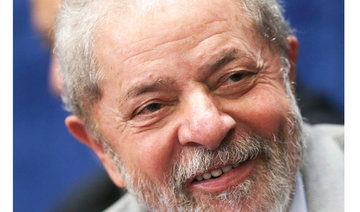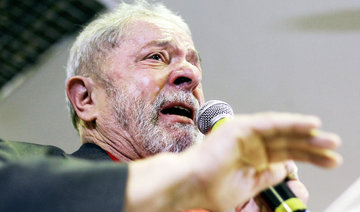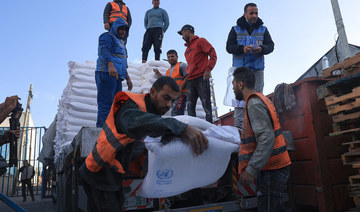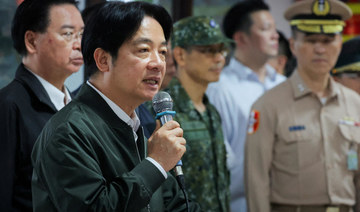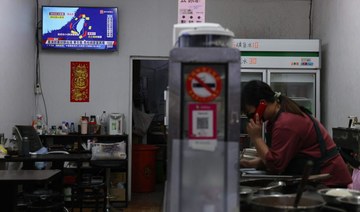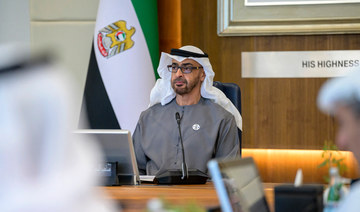BRASILIA: Brazil's former president Luiz Inacio Lula da Silva has been charged by prosecutors who said the leftist politician was the mastermind behind the country's biggest bribery scheme.
Lula, a founder of the Workers Party (PT) that controlled Brazil's presidency from 2003 until last year, is already facing five separate trials on corruption charges with a ruling in the first expected by July.
Under Brazilian law, it is now up to a federal judge to decide if Lula will stand trial for the latest charges.
Prosecutors accused Lula of leading a scheme in which politicians and executives at state-run oil company Petrobras received bribes from companies seeking contracts for public projects.
Lula's defense lawyers said in a statement that the new charges were "frivolous" and part of political persecution of the former leader who is leading opinion polls for next year's presidential elections.
If Lula were convicted in any of the trials, and the ruling was upheld by a second court, he would be legally disqualified from running and likely go to prison.
Current Brazilian President Michel Temer is facing calls for his resignation over corruption and said he would not step down even if he was formally indicted by the Supreme Court. Temer took office a year ago after the ouster of Dilma Rousseff, who succeeded Lula.
Temer said in a recent interview he would not step down even if he was formally indicted by the Supreme Court.
"I will not resign. Oust me if you want, but if I stepped down, I would be admitting guilt," Temer told Folha de S.Paulo, Brazil's biggest newspaper.
Brazilians who have become inured to a massive, three-year corruption investigation were shocked last week by the disclosure of a recording that appeared to show Temer condoning the payment of hush money to a jailed lawmaker.
The scandal has threatened to tear apart Temer's coalition in Congress and leave Latin America's largest economy adrift as the president fights for his political survival, just a year after the impeachment of his predecessor.
The Supreme Court has opened an investigation into the revelations that were part of plea bargain testimony by the billionaire owners of meatpacking giant JBS SA.
The court had been expected to decide this week whether to suspend the investigation at Temer's request until it could be determined if the recording of his March conversation with JBS chairman Joesley Batista was doctored to implicate the leader.
But Chief Justice Carmen Lucia ruled on Monday that the court would not take up the recording issue until Brazil's federal police finished their examination of the tape and determined if it had been edited, possibly making it inadmissible as evidence in the investigation.
Shortly after, Temer's lawyers said they had dropped their request that the investigation be suspended, given the court's decision that the tape must be evaluated.
Ricardo Molina, a private expert Temer's team hired to examine the tape, told reporters on Monday that the recording had clearly been edited and should not be accepted as evidence.
The investigator said he had found at least 70 points of "irregularities" in the 38-minute recording, such as moments where the audio was "clipped," or when the voice of Temer was unintelligible.
Regardless, the head of Brazil's powerful national bar association, which is calling for Temer's impeachment, said plea-bargain testimony by JBS executives included more evidence against the president than just the recording. Claudio Lamachia told reporters that even Temer's meeting with Batista, who was under corruption investigations, was unacceptable.
The Brazilian Social Democracy Party (PSDB), Temer's biggest ally in the governing coalition, put off a meeting on Sunday to decide whether to continue supporting the beleaguered president.
Party officials said on Monday the PSDB would wait until the Supreme Court ruled on whether to continue an investigation of Temer.
The president, who took office a year ago after the ouster of former running mate Dilma Rousseff, has come under unrelenting pressure to step down and let Congress elect a new president for the remainder of his term.
Still, Temer maintained a confident outlook, telling Folha he was "absolutely" sure he was capable of finishing his term through the end of 2018 without giving up on his legislative agenda, which includes an ambitious overhaul of the country's labor and social security regulations.
His coalition had already been struggling to muster the votes for the unpopular social security reform. Financial markets, which had largely anticipated approval of the reforms, slumped last week when the scandal broke.
S&P Global Ratings threatened to downgrade Brazil's rating further into junk territory over the next three months if political turmoil hampered the advance of economic reforms.
The Brazilian real extended losses on Monday morning, weakening more than 1 percent. Yields on interest rate futures were up, indicating a deep rate cut by the central bank at the end of this month has become less likely as uncertainty grows.
"I will demonstrate political strength in coming weeks precisely by putting important bills to vote (in Congress)," Temer told Folha. "I am not doomed."
Temer said the recording was not proof of wrongdoing and he did not report the vague references to bribery of officials because he did not believe them. "Joesley is a loudmouth," Temer said.
"I have shown, with relative success, that what that businessman did was to induce a conversation," the president told Folha, acknowledging that he had been wrong to make no record of his meeting with the businessman in the official ledger of visitors.
Lula faces new corruption charges
Lula faces new corruption charges
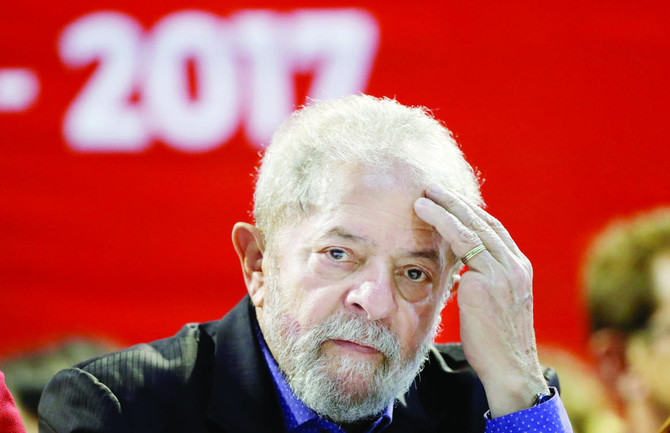
Number of new German citizens hits another high last year, with many Syrians naturalized

About 200,100 people were granted German citizenship in 2023, the Federal Statistical Office said. That was an increase of about 31,000, or 19 percent, compared with the previous year.
The increase followed a 28 percent rise in 2022, which also was fueled by large numbers of Syrians being naturalized as increasing numbers of people who migrated to Germany between 2014 and 2016 fulfilled the requirements for citizenship.
Last year, 75,500 people from Syria were naturalized — the biggest single group, accounting for 38 percent of the total — the statistics office said. That number was up 56 percent compared with 2022. They had spent an average 6.8 years in Germany before becoming citizens.
About 10,700 citizens each of Turkiye and Iraq became German citizens last year, putting those groups in second place.
The overall number of new citizens was the highest since current records started in 2000 following a change in the law under which people of German ancestry from the former Soviet Union, who arrived in large numbers in the 1990s, were automatically granted citizenship rather than having to apply for it.
Requirements for being granted citizenship include a working knowledge of German and proof of being able to support oneself financially.
Under the law as it was last year, people were in principle required to have lived in Germany for at least eight years, though that didn’t apply to spouses and children. The period could be reduced to six years for people who show “special integration accomplishments” such as very good knowledge of the language, professional achievements or civic engagement.
Those rules are being eased under new legislation that will take effect on June 27. People will be eligible for citizenship after five years in Germany, or three in case of “special integration accomplishments.” German-born children will automatically become citizens if one parent has been a legal resident for five years, down from eight years now.
Restrictions on holding dual citizenship will also be dropped. In principle, most people from countries other than European Union members and Switzerland have had to give up their previous nationality when they gained German citizenship, though there were some exemptions.
Germany has about 84 million inhabitants.
UK’s Sunak proposes tax cuts for pensioners in new election pledge

- The number of pensioners in Britain rose by 140,000 to 12.6 million in the year to February 2023
- The new proposal, which the party termed “triple lock plus,” will cost 2.4 billion pounds a year by 2029/30
British Prime Minister Rishi Sunak on Monday proposed tax cuts for millions of pensioners in his latest campaign pledge, highlighting the importance of older voters in the upcoming July election.
Sunak’s Conservative Party said it would introduce a new age-related allowance and deliver a tax cut of around 100 pounds ($128) for each of 8 million pensioners in 2025, rising to almost 300 pounds a year by the end of the next parliament.
“This bold action demonstrates we are on the side of pensioners. The alternative is Labour dragging everyone in receipt of the full state pension into income tax for the first time in history,” Sunak, who last week called a general election for July 4, said in the statement.
The number of pensioners in Britain rose by 140,000 to 12.6 million in the year to February 2023. Close to 50 million Britons will be eligible to vote in the election, which opinion polls predict is likely to end 14 years of Conservative rule in the country.
The Conservative Party said the proposal comes alongside the its commitment to the so-called triple lock, which guarantees increases to publicly funded pensions by the level of earnings, inflation or 2.5 percent, whichever is highest.
Labour has also committed to retain the policy, which was introduced by a Conservative government in 2011 to prevent pensioners from falling into poverty.
However, costs associated with it have come under increased scrutiny in recent years after British inflation soared, pushing up the government bill for state pensions by an additional 11 billion pounds last year.
The new proposal, which the party termed “triple lock plus,” will cost 2.4 billion pounds a year by 2029/30 and be funded through the government’s previously announced plan to raise an extra 6 billion pounds a year by clamping down on tax avoidance and evasion, the party said.
“This is just another desperate move from a chaotic Tory party torching any remaining facade of its claims to economic credibility,” Labour shadow paymaster general Jonathan Ashworth said in a statement on the plans.
The paymaster general falls under the Treasury and acts as a banker for most government departments.
Thousands protest as Taiwan’s parliament passes contested reforms

- Parliament reforms give lawmakers the power to ask the military, private companies or individuals to disclose information deemed relevant by parliamentarians
TAIPEI: Thousands of people protested outside Taiwan’s parliament on Tuesday after it passed a reform package to increase oversight of the government pushed by the opposition but opposed by the ruling party, which did not have the numbers to block it.
The peaceful protests, and sometimes violent confrontations in parliament over the reforms, have been taking place against a backdrop of broader concern about efforts by China, which views Taiwan as its own territory, to influence the island’s politics.
The Democratic Progressive Party’s (DPP) Lai Ching-te won the presidency in January elections, but the party lost its majority in parliament. Taiwan’s main opposition party, the Kuomintang (KMT), along with the small Taiwan People’s Party, together have the most seats.
The parliament reforms give lawmakers the power to ask the military, private companies or individuals to disclose information deemed relevant by parliamentarians.
They also criminalize contempt of parliament by government officials, and require the president to give regular reports to parliament and answer lawmakers’ questions, which would be a first for Taiwan.
The DPP says the reforms were forced through without proper consultation and their content either vague or an over-reach of power, and on Tuesday its lawmakers threw garbage bags and paper planes at their opposition counterparts.
“You can seize parliament but you cannot seize public opinion,” DPP parliament leader Ker Chien-ming said in an address to the chamber, adding that Beijing had influenced Taiwanese politics.
Opposition lawmakers, holding sun-shaped balloons, shouted “let sunlight into parliament.” Both parties covered the chamber with banners.
The KMT has denounced the DPP for trying to “paint them red,” the color of China’s Communist Party, and says the DPP is trying to stymie efforts to investigate corruption cases and sow unfounded fears about the reforms.
Outside parliament, protesters showed their anger at the reforms being passed, and also shouted “refuse Chinese political interference,” among other slogans.
“This is the people’s voice,” said Zheng Hung-gun, 33, who works in the food industry. “Taiwanese are not afraid of enemies from outside but we are worried about our internal enemies.”
On Friday night, tens of thousands thronged the roads around parliament protesting the reforms.
Several senior KMT leaders have visited China this year, in what the party says is an effort to keep lines of communication open. It denies being pro-Beijing.
China refuses to speak to Lai or the DPP, saying they are “separatists.” Lai says only Taiwan’s people can decide their future and has repeatedly offered talks with China, but been rebuffed.
UAE President arrives in Seoul for two-day state visit

DUBAI: UAE President Sheikh Mohamed bin Zayed Al-Nahyan arrived in Seoul on Tuesday for a two-day state visit after an invitation from South Korean President Yoon Suk-yeol.
After his arrival, Sheikh Mohamed, on X, said he and Yoon would discuss “ways to advance the special strategic partnership between the UAE and Republic of Korea. Through economic partnership and close people-to-people ties, our nations are determined to achieve further progress that benefits all.”
The president’s plane was escorted by military aircraft in a gesture of respect and welcome as it entered South Korean airspace, UAE state news agency WAM reported.
Sheikh Mohamed is accompanied by a high-level delegation including Sheikh Hamed bin Zayed Al-Nahyan, managing director of the Abu Dhabi Investment Authority; Sheikh Hamdan bin Mohamed bin Zayed Al-Nahyan; Sheikh Mohammed bin Hamad bin Tahnoun Al-Nahyan, adviser for special affairs at the presidential court; Ali bin Hammad Al-Shamsi, secretary-general of the Supreme Council for National Security; and Sultan bin Ahmed Al-Jaber, minister of industry and advanced technology.
Sheikh Mohamed is expected to discuss bilateral ties with his South Korean counterpart focusing on trade, investment, energy and technology.
They will also address regional and international developments of common interest, WAM reported.
“The meeting comes within the framework of strategic partnership between the UAE and South Korea in line with their vision to achieve a better and more prosperous future for the countries,” according to the WAM report.
The UAE president is expected to travel to China on May 30 for a state visit when Beijing hosts Arab leaders for the opening ceremony of the 10th Ministerial Conference of the China-Arab States Cooperation Forum.
The forum aims to deepen “consensus between China and Arab countries” and “issue a common voice between China and Arab countries on the Palestinian issue,” said China’s Vice Foreign Minister Deng Li.
Russia invites Afghanistan’s Taliban to major economic forum

- Russia has been slowly building ties with the Taliban, though the movement is still officially outlawed in Russia
- In 2003, Russia formally labelled the Taliban a terrorist organization, though it had periodic informal contacts with them
MOSCOW: Russia has invited Afghanistan’s Taliban to its biggest annual economic forum as Moscow moves to remove a ban on the Islamist movement, a senior Russian diplomat was quoted as saying on Monday.
Since the Taliban seized power in August 2021 as US-led forces withdrew after 20 years of war, Russia has been slowly building ties with the Taliban, though the movement is still officially outlawed in Russia.
Russia’s foreign and justice ministries have reported to President Vladimir Putin on the issue of removing the ban, Zamir Kabulov, director of the Second Asia Department at the Russian Foreign Ministry, told state news agency TASS.
Some questions remain, Kabulov was quoted as saying, though he said that an invitation to attend the June 5-8 St. Petersburg international economic forum had been extended to the Taliban.
Afghan leaders, he said, were traditionally interested in the purchase of oil products.
The St. Petersburg forum, which once hosted Western CEOs and investment bankers from London and New York, has changed significantly amid the Ukraine war which has triggered the biggest crisis in Russia’s relations with the West since the 1962 Cuban Missile Crisis.
Western investors seeking a slice of Russia’s vast resource wealth have now been replaced by businesses from China, India, Africa and the Middle East.
The Taliban, which means “students” in the Pashto language, emerged in 1994 around the southern Afghan city of Kandahar. It was one of the factions fighting a civil war for control of the country following the withdrawal of the Soviet Union and subsequent collapse of the government.
It originally drew members from so-called “mujahideen” fighters who, with support from the United States, repelled Soviet forces in the 1980s.
In 2003, Russia formally labelled the Taliban a terrorist organization, though it had periodic informal contacts with the movement.


